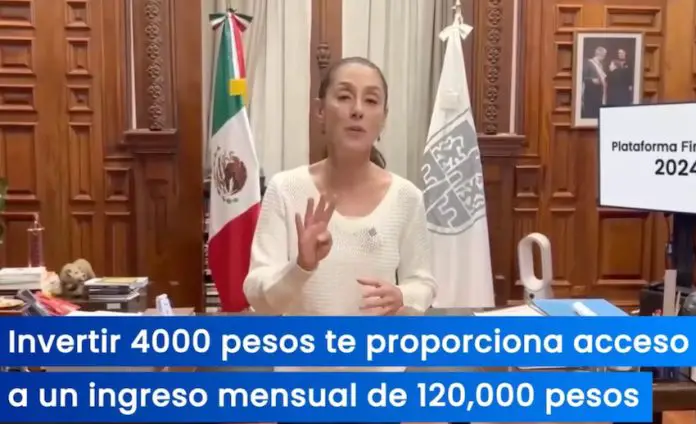True or false? Presidential candidate Claudia Sheinbaum is promoting a kind of pyramid scheme to the very citizens she hopes will vote for her on June 2.
You guessed it.

A video in which the former Mexico City mayor purportedly invites Mexicans to make a relatively small investment that will bring them extremely healthy returns surfaced on social media this week, but the Morena party presidential hopeful promptly denounced the clip as a “complete fraud.”
“What madness! It’s a video that they’re doing with artificial intelligence because you’ll see that it’s my voice, but it’s a fraud, they’re saying that we’re going to hand over money,” Sheinbaum said in an Instagram live video on Wednesday.
In the video — described as a “deepfake” by Wired magazine — the apparently digitally manipulated Sheinbaum impersonator presents a “marvelous opportunity” in which an initial investment of just 4,000 pesos (US $233) can be turned into income of 100,000 pesos or more per month.
“You’ve heard well. This isn’t a dream, it’s a reality that you are invited to take advantage of,” says the Claudia copycat.
“… Here’s the best part: I will personally reveal methods to increase your income. … Click the link below this video and see for yourselves how amazing these results are.”
In her video message, Sheinbaum warned citizens to be “very careful” and said that she had reported the fake footage to social media companies.
“If it’s necessary we’ll have to file a criminal complaint, but it’s very important that no one is fooled,” she said.
While the main aim of the video appears to be to defraud people of money, another objective could be to hurt Sheinbaum — the clear favorite to become Mexico’s next president — in an electoral sense.

Néstor Wario, the CEO and co-founder of the Mexican company Brita Inteligencia Artificial, predicted in late 2023 that videos, photos and audio purporting to feature Mexican politicians would emerge in the lead-up to the June 2 elections, at which Mexicans will vote for a new president, renew both houses of federal Congress and elect thousands of people to state and municipal positions.
“On the internet there are now platforms for the development of deepfakes, where anyone can forge the identity of someone by changing their face,” he said.
“This could generate false information or fake news to confuse the population, even more so in electoral times in Mexico. [Fake videos and audio] could be used to manipulate public opinion, as they have already been used in other countries. We’re going to start seeing images or videos of supposed politicians in compromising situations or audio manipulated for the same purpose,” Wario said.
Senator Alejandra Lagunes of the Ecological Green Party of Mexico said in November that she was very worried about deepfakes and “the power they have to distort reality” and affect the democratic process.
North of the border, “The deepfake era of US politics is upon us,” a CNN headline asserted this week.
“One distressing headline out of New Hampshire as voters prepared to cast in-person primary ballots was that a fake version of President Joe Biden’s voice had been used in automatically generated robocalls to discourage Democrats from taking part in the primary,” CNN’s report began.
